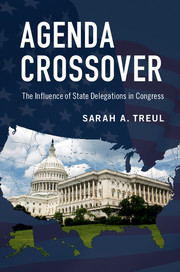Book contents
- Frontmatter
- Dedication
- Contents
- List of Figures
- List of Tables
- Acknowledgments
- 1 State Delegations in Congress
- 2 A History of State Delegations
- 3 State Delegations and Legislative Behavior in the House
- 4 State Delegations and Legislative Behavior in the Senate
- 5 Agenda Crossover in the U.S. Congress
- 6 Rethinking State Delegations in Congress
- Appendix A Interviews
- Appendix B Wisconsin's Unwritten Rule
- Bibliography
- Index
Appendix A - Interviews
Published online by Cambridge University Press: 13 April 2017
- Frontmatter
- Dedication
- Contents
- List of Figures
- List of Tables
- Acknowledgments
- 1 State Delegations in Congress
- 2 A History of State Delegations
- 3 State Delegations and Legislative Behavior in the House
- 4 State Delegations and Legislative Behavior in the Senate
- 5 Agenda Crossover in the U.S. Congress
- 6 Rethinking State Delegations in Congress
- Appendix A Interviews
- Appendix B Wisconsin's Unwritten Rule
- Bibliography
- Index
Summary
Thirty-two structured, personal interviews were conducted with current or former members of Congress and/or their staff for this project. The interviews started as a way to talk to members about how they saw party operating in Congress today, but, as I write in the book, I was struck almost immediately by a common refrain: members still found their state important for representation. This got me interested in this project and finding out more about state delegations in Congress today. The interviews mentioned in this book are not meant to be used as data but are used to illustrate points and help the reader understand how I constructed the theory of agenda crossover.
The interviews were conducted between June 2011 and June 2014. In each case I requested an interview with the member of Congress, but sometimes only the legislative director, chief of staff, or other staff member was available. All in total, I interviewed nineteen members of Congress and thirteen staffmembers. Although interviewing the members themselves was always my goal, staff members are equally (if not more) informative, as they are the ones responsible for gathering information about policy and also act as constituent liaisons (Evans 2002; Miler 2010).My sample was not random, but I did attempt to make the sample representative of the larger population ofmembers. As a result, the sample is representative of the full Congress in terms of party, seniority, and state size (see Table A.1). In two cases I was able to interview the member and his chief of staff – taking the number of actual interviews to thirty-four. This acted as an informal reliability check on the information staff and members were providing me. This Appendix provides details of these interviews.
CONDUCTING THE INTERVIEWS
Scheduling the interviews was done over the phone or via e-mail. The interviews themselves were done both over the phone and in person. This depended on when and where the interview was scheduled. All “on location” interviews took place in the member's legislative office (district or Washington) or in another office setting such as a university office. The interviews were confidential, and each member or staff member was assured that his or her name would not be disclosed. This was explained when setting up the interview and at the beginning of the interview.
- Type
- Chapter
- Information
- Agenda CrossoverThe Influence of State Delegations in Congress, pp. 153 - 155Publisher: Cambridge University PressPrint publication year: 2017



